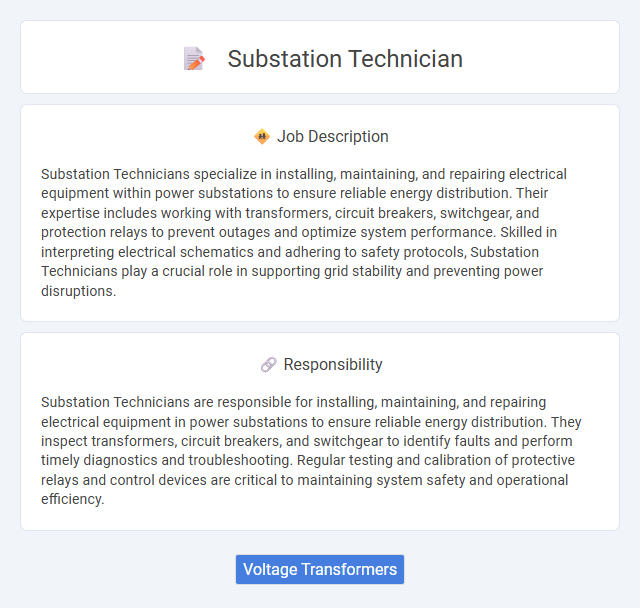
Substation Technicians specialize in installing, maintaining, and repairing electrical equipment within power substations to ensure reliable energy distribution. Their expertise includes working with transformers, circuit breakers, switchgear, and protection relays to prevent outages and optimize system performance. Skilled in interpreting electrical schematics and adhering to safety protocols, Substation Technicians play a crucial role in supporting grid stability and preventing power disruptions.
Individuals with strong problem-solving skills and a high level of attention to detail are likely to be well-suited for a Substation Technician role, given the technical demands and safety considerations inherent in the job. Those who can work effectively under pressure and have a good understanding of electrical systems may find this career both rewarding and challenging. Conversely, people who struggle with physical labor or have difficulty adhering to strict safety protocols might face challenges in this position.
Qualification
Substation Technician positions typically require a high school diploma or equivalent, with a preference for candidates holding technical certifications or an associate degree in electrical technology or related fields. Proficiency in reading electrical schematics, knowledge of high-voltage equipment, and experience with power distribution systems are essential qualifications. Industry certifications such as OSHA safety training and specialized substation technician credentials enhance job prospects and demonstrate expertise.
Responsibility
Substation Technicians are responsible for installing, maintaining, and repairing electrical equipment in power substations to ensure reliable energy distribution. They inspect transformers, circuit breakers, and switchgear to identify faults and perform timely diagnostics and troubleshooting. Regular testing and calibration of protective relays and control devices are critical to maintaining system safety and operational efficiency.
Benefit
Substation Technicians likely benefit from competitive salaries and robust health insurance packages, enhancing financial stability and personal well-being. The job may offer opportunities for career advancement and skill development through specialized training programs. Safety protocols and a supportive work environment probably contribute to job satisfaction and reduced workplace hazards.
Challenge
The role of a Substation Technician likely involves managing complex electrical systems, which may require advanced troubleshooting skills and precise attention to safety protocols. Challenges can include diagnosing unexpected equipment failures and working in high-risk environments where maintaining system reliability is crucial. There is a probable demand for adaptability and continuous learning to keep up with evolving technologies in power distribution.
Career Advancement
Substation Technicians specializing in electrical power systems can advance their careers by gaining certifications such as NETA or OSHA safety standards and acquiring expertise in SCADA systems and relay protection technologies. Progression often leads to senior technician roles, supervisory positions, or transition into engineering and project management within utility companies. Continuous training in emerging smart grid technologies and renewable energy integration significantly enhances career growth opportunities in this field.
Key Terms
Voltage Transformers
Substation Technicians specialize in installing, maintaining, and troubleshooting voltage transformers to ensure accurate voltage measurement and reliable power distribution. Expertise in testing insulation resistance, performing calibration, and diagnosing transformer faults is essential for maintaining system safety and efficiency. Proficiency in handling high-voltage equipment, interpreting technical schematics, and adhering to industry standards like IEEE and OSHA enhances operational reliability and minimizes downtime.
 kuljobs.com
kuljobs.com